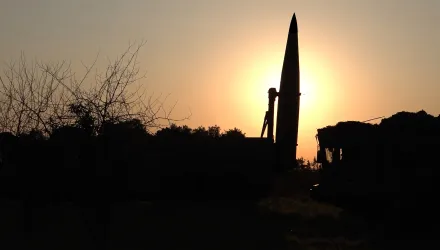Hours after the death of King Fahd of Saudi Arabia, his brother, Crown Prince Abdullah, was declared king, and Prince Sultan, the minister of defense, became the new crown prince and successor to the new 81-year-old king. And all indications from Riyadh seem to suggest that policy changes are not on the radar screen for a country that has been internally challenged for some time. The appointment of the 77-year-old Prince Sultan is a vote of confidence for the kingdom's status quo and signals that the regime is not interested in internal reform.
Sadly, this is a missed opportunity.
The elders of the royal family, who traditionally determine the line of succession that governs Saudi Arabia, had an opportunity to choose a younger leader more in tune with the needs of change in the kingdom—but they didn't.
Saudi Arabia is facing numerous challenges that not only will require a delicate balance between reformists and traditionalists, it must also make decisive reforms that will move the country forward.
It appears that the new king and crown prince are not keen on tackling issues needed to propel social changes. Although modest municipal elections took place earlier this year in response to external pressures from the United States and liberal Saudis, true power in Saudi Arabia is still concentrated in just a few hands, the royal family's.
As reform and democracy are echoed around the Middle East and Iraq struggles to complete its democratically written constitution on time, Saudi Arabia is lagging behind. Progressive policies are not of the essence. Women can't drive, and their rights as citizens are a distant second to those of men. How could a society succeed when half of its population is marginalized?
The educational system is also out of touch with reality. The school system has been skewed toward religious studies, thus reducing the time spent on other needed disciplines required to prepare young Saudis for the future. Saudis are graduating in record numbers from Saudi universities with degrees in religion and humanities—making them increasingly unemployable in times when science and technology are the name of the game. There is a deepening technological gap between Saudi Arabia and many neighboring developing nations. Educational reform and women's rights are desperately needed in Saudi Arabia, but the new leadership's policy is much like that of the old one.
As the price of crude oil escalates, revenues to the kingdom are reaching record levels. This is after many years of serious economic challenges that, as in many parts of the Arab world, brought a decline in economic well-being to the average Saudi. Beyond the beautiful buildings and the impressive infrastructure, the country is not better off. The gross national product per capita, even with all the oil revenue, is hovering around $12,000, compared with $20,000 in the 1970s. Clearly, the economic policies and the vision of the dominant leadership have malfunctioned along the way.
Members of the rather large royal family are intricately involved in the private sector and, in many cases, abusing their royal privileges to achieve economic gains for themselves. Although King Abdullah has been an outspoken critic of corruption and a proponent of economic privatization, there is little evidence of overwhelming progress for the population at large.
An opportunity to choose a younger prince more in touch with the problems of the citizens was missed with the appointment of Prince Sultan. His appointment was to be a signal that the country is fine and well. But is it?
The entrenched social problems in Saudi Arabia deserve immediate attention and drastic policy changes that may ruffle some feathers. It is imperative to move the country from its limited definition of social order and to experiment with social change. Change may prove to be healthy and good and may help defuse the anger, frustration and resentment that many young Saudis feel toward their government. Saudi Arabia needed young, bold leadership that understands that the oil will one day run out and that there is a need for pragmatic policy changes now that will have Saudi's future best interest in mind. Unfortunately, change is unlikely to happen in the foreseeable future.
Raja Kamal is associate dean for resource development at the Harris School of Public Policy at the University of Chicago.
Kamal, Raja. “Saudi Arabia's Missed Opportunity.” Chicago Tribune, August 4, 2005


